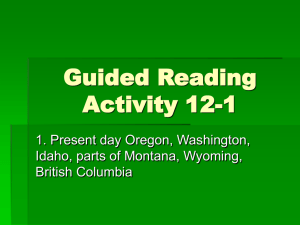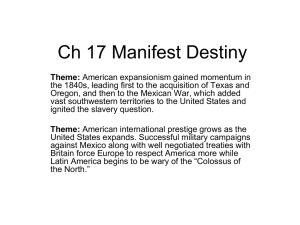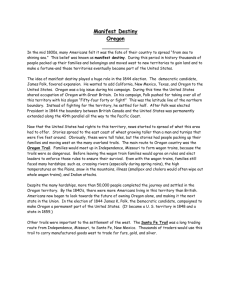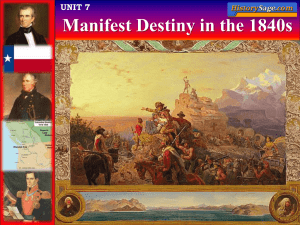Manifest Destiny – The Oregon Country
advertisement
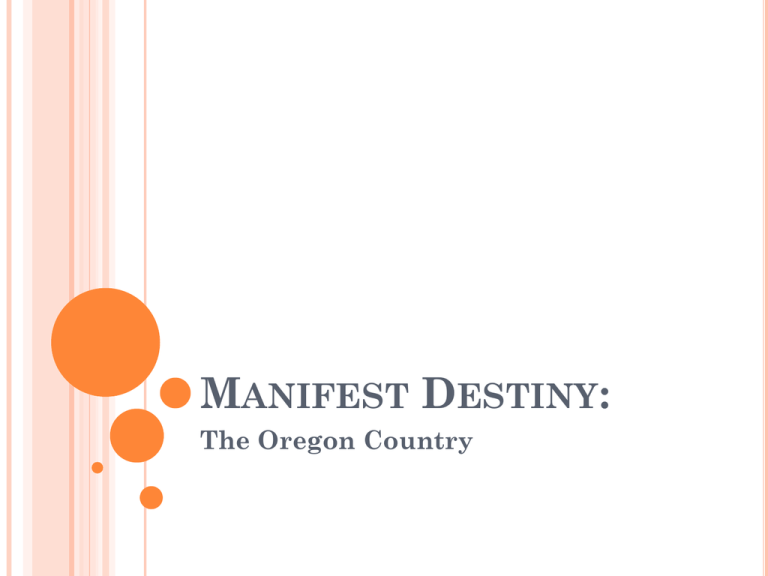
MANIFEST DESTINY: The Oregon Country RIVALRY IN THE NORTHWEST The Oregon country was the huge area that lay between the Pacific Ocean and the Rocky Mountains north of California. It included all of what is now Oregon, Washington, and Idaho plus parts of Montana and Wyoming as well as half of what is now the Canadian province of British Columbia. In the early 1800s, 4 nations laid claim to this region: the United States, Great Britain, Spain, and Russia. ADAMS-ONIS TREATY In 1819 Secretary of State John Quincy Adams negotiated the Adams-Onis Treaty with Spain which set California’s northern border and resigned any Spanish claim to Oregon. In 1824 Russia also surrendered its claim to the land south of Alaska. In 1818 Adams worked out an agreement with Britain for joint occupation, which meant that people from both countries could settle there. In the following years, thousands of Americans streamed into Oregon. MOUNTAIN MEN The 1st Americans to reach the Oregon country were not farmers but fur traders who had come to trap beaver pelt which was in great demand. Merchant John Jacob Astor of New York established trading posts in the region and in 1808 organized the American Fur Company which became the most powerful of its kind. Most of the men who settled in the region were a tough, independent breed called mountain men. Many had Native American wives and adopted Native American ways. In late summer they would all gather for a rendezvous, or meeting. At the annual rendezvous, they met with trading companies to sell or trade their skins. It also became a social event with games and contests. SETTLING OREGON In the 1830s, reports of fertile land and economic troubles back East caused more people to begin moving West. As the numbers of beaver dwindled, many of the mountain men who lived there served as guides to lead the parties of settlers. A number of missionaries also chose to move West in order to bring Christianity to the Native Americans. Dr. Marcus Whitman and his wife established a mission in 1836 near present day Walla Walla, Washington. New settlers unknowingly brought measles to the mission, though, and an epidemic killed many of the Native American children. Blaming the Whitmans for the sickness, the Cayuse attacked the mission and killed them and 11 others THE OREGON TRAIL In the early 1840s, with the depression caused by the Panic of 1837, the “great migration” had begun. These pioneers were called emigrants because they left the United States to go to Oregon. Before the difficult 2,000-mile journey, these pioneers stuffed their canvas-covered wagons, called prairie schooners, with supplies. Gathering in Independence or other towns in Missouri, they followed the Oregon Trail across the Great Plains, along the Platte River, and through the South Pass of the Rocky Mountains. On the other side they took a trail along the Snake and Columbia Rivers into Oregon country. MANIFEST DESTINY Many believed that the United State’s mission was to spread freedom by occupying the entire continent. In the 1840s New York newspaper editor John O’Sullivan put the idea into more specific words declaring it was America’s, “Manifest Destiny to overspread and to possess the whole of the continent which Providence has given us.” Between 1840 and 1845, the number of American settlers in the area increased from 500 to 5,000 while the British population remained at 700. “FIFTY-FOUR FORTY OR FIGHT” James K. Polk received the Democratic Party’s nomination for president in 1844 partly because he supported American claims for sole ownership of Oregon. Democrats campaigned using the slogan “Fifty-four Forty or Fight,” meaning that they believed the this should be the nation’s northern border. Henry Clay of the Whig Party, Polk’s principal opponent, did not take a strong position on the Oregon issue, and the anti-slavery Liberty Party took so many votes from Clay, that Polk REACHING A SETTLEMENT Britain would not accept a border at fifty-four forty because to do so would mean giving up its claim entirely. Instead, in June 1846, the 2 countries compromised, setting the boundary between the American and British portions of Oregon at latitude 49 N. During the 1830s Americans also sought to fulfill their Manifest Destiny in another direction as well…Texas.
